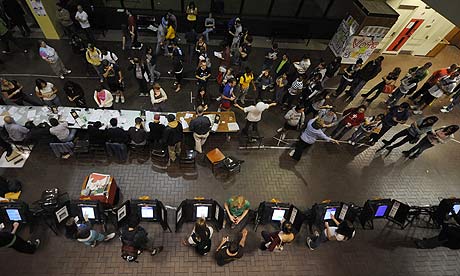 Image by winkydo via Flickr
Image by winkydo via Flickr
I haven't posted much of late; I've been helping the Election Transparency Coalition publish their
new site tracking the NY counties as they move forward passing resolutions supporting keeping our lever machines. You can find the site
here. Take a look.
Meanwhile, the tenth county -- Sullivan -- has unanimously adopted a resolution. That means that of the ten counties, only one legislator, in Columbia County, voted against keeping levers.
On the other hand, the NY State Board of Elections is moving forward with their "pilot" roll-out of uncertified optical scanners.
Election Integrity: Fact & Friction: New York Rolls Out Uncertified Voting Systems for 2009 Elections: "ALBANY -- At a May 12th Commissioners' meeting, after collaborating with the US Dept. of Justice, the New York State Board of Elections cavalierly decided to risk the disenfranchisement of nearly a million of the state's voters, by allowing what one commissioner called a 'huge pilot' of uncertified software-driven electronic vote-counting systems around the state in 45 of its 62 counties."
As we've discussed here in the past, certification doesn't mean secure. It means that an independent testing lab has put a machine through its paces to determine whether that model, at that point in time, meets the criteria that the
Federal Election Commission has laid out. The current criteria was published a couple of years ago;
new, more stringent criteria is currently in the public comment phase. Neither set of criteria addresses security because software-based systems, by their nature, can't be secured.,
So, the NYS Board of Elections is ignoring even this watered down, but none-the-less
required by law, certification process that is supposed to protect the integrity of our vote. They seem to think calling it a "pilot" makes it okay.
Is something fishy around here? Certainly smells like it! What is their motivation to ignore the law?
You can read the details at
Election Integrity.
Howard Stanislavic, who publishes that blog, has included links to the Board of Elections documents that dictate the terms of the pilot. He raises several legal and common sense issues. I recommend you read his post and check to see whether your county is one planning to roll out uncertified machines.
Why is the State Board of Elections in such a hurry to implement such a flawed system?


![Reblog this post [with Zemanta]](http://img.zemanta.com/reblog_e.png?x-id=9ac3a6d7-76f6-4e8e-9d4c-d6c416e653ee)

![Reblog this post [with Zemanta]](http://img.zemanta.com/reblog_e.png?x-id=b3149507-325b-4612-a296-a21443cfe588)

![Reblog this post [with Zemanta]](http://img.zemanta.com/reblog_e.png?x-id=7ee186e7-4200-44a0-982f-6dc56ea0aece)


![Reblog this post [with Zemanta]](http://img.zemanta.com/reblog_e.png?x-id=171fe096-8199-43aa-aec8-16f01f143093)

![Reblog this post [with Zemanta]](http://img.zemanta.com/reblog_e.png?x-id=f5273db1-a9d6-44f4-ac80-5e503db34ed2)

![Reblog this post [with Zemanta]](http://img.zemanta.com/reblog_e.png?x-id=ea0816c1-7d6f-42b5-af0c-18355c7e8404)



